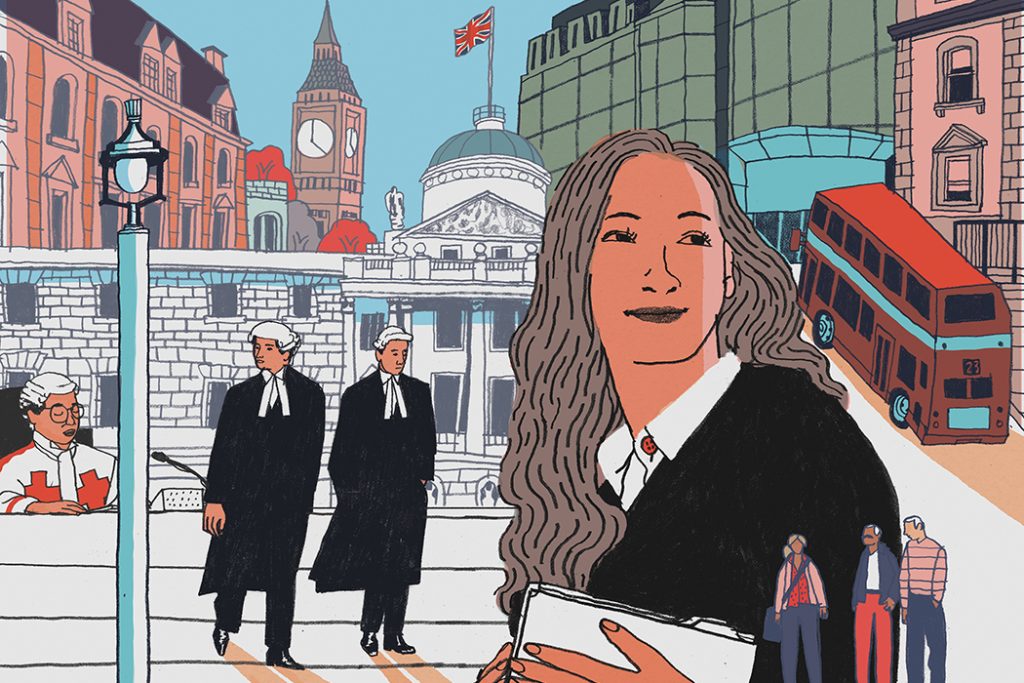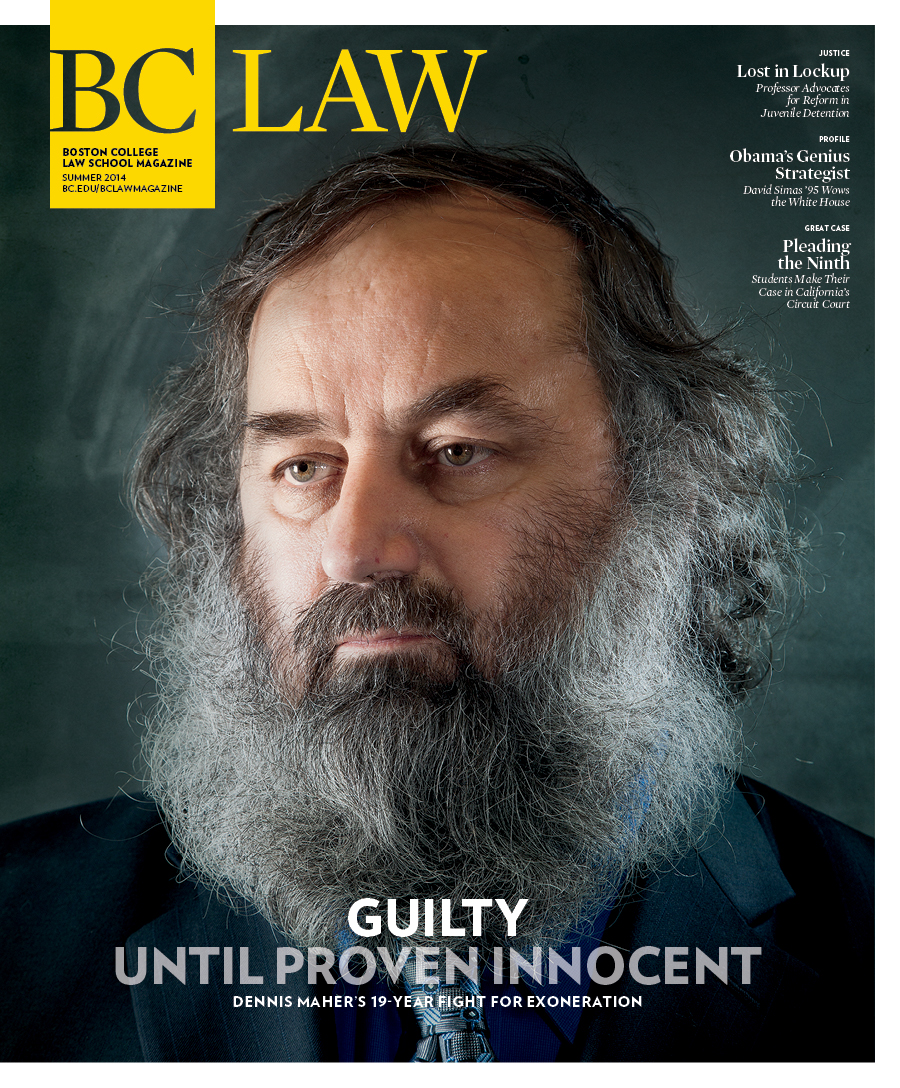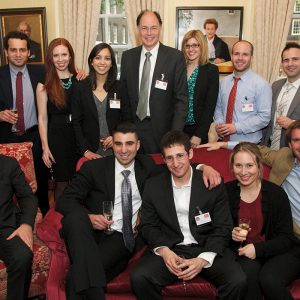The Inns of Court. Chancery Lane. The Old Bailey. These icons of legal London conjure a universe inhabited by bewigged judges and barristers steeped in ancient traditions, known to most of us only from novels and Masterpiece Mystery crime dramas.
Since 1989, when Boston College Law School and King’s College London launched the collaborative International and Comparative Law Program, nearly 200 BC Law students have explored the reality behind the mythology. In a rigorous five-month-long clinical program offered in the spring semester, cohorts of approximately twelve students take classes alongside their UK counterparts at the Dickson Poon School of Law at King’s College, London, and work up to twenty hours a week as interns in barristers’ chambers, human rights nonprofits, and multinational corporations.
To mark the program’s twenty-fifth anniversary, the two institutions jointly presented a two-day conference, “Globalizing Forces in Legal Education, Trade, and Human Rights,” at King’s College on May 8 and 9. More than eighty participants, including alumni of both schools, former on-site directors, and placement supervisors, gathered to hear the keynote address on the new world economy by the Hon. James Bacchus, former US Congressman and former chair of the World Trade Organization Appellate Body. Panels of legal educators and practicing lawyers from Europe, the US, and Asia considered themes that included global experiential training and corporate social responsibility for human rights abuses. The event culminated with a celebration at the Inner Temple.
The experimental program conceived under the deanship of Daniel Coquillette was steered in its early years by professors John Flackett, Cynthia Lichtenstein, and the late Sanford Fox as on-site directors. The program has evolved into what Associate Dean for Global Initiatives Professor Frank Garcia calls “the heart and cornerstone of the Law School’s global engagement.”
Garcia attributes the program’s success to two main factors: a strong relationship with an excellent London school, and the efforts of successive on-site directors to find challenging placement opportunities for students.

The focus on experiential learning was key from the start, says Professor Emerita Cynthia Lichtenstein. She monitored students’ workplace experiences through journals in which they reported their day-to-day doings and observations. The journals were shared in a weekly director’s seminar, a practice that has remained central to the program.
This year, Professor Alan Minuskin served as on-site director for the fourth time. During his second stint, in 2006, he decided to take the director’s seminar “on the road” and capitalize on the geographical closeness of the students’ placements by holding each student’s presentation on his or her experience in the relevant workplace. Sampling the glittering corporate towers of Canary Wharf or the utilitarian quarters of human rights NGOs presents the contrast of the legal cultures where students are working.
Thanks to the program’s longevity, says Minuskin, “we have a really good reputation over here in a lot of legal circles.” That has paid dividends in terms of securing placements at both well-established and top new firms, including the human rights-focused Matrix Chambers, co-founded in 2000 by Cherie Blair, QC.
London-based alumni are also invaluable as placement supervisors. Among them is David Curtin ’85, general counsel–international at Northern Trust Company. “The BC Law program provides a fantastic opportunity for students to study EU law and experience first-hand the practice of law in a foreign country,” he says.
Two other alumni sponsors are the 1986 Jessup Cup World Championship winners Florence Herard ’86, now legal counsel and director at Citigroup, and Katherine Ashdown ’86, managing director at Bank of America Merrill Lynch, who have taken part in the program since 2008. “We are committed to this process,” says Herard.
Integral to the London experience is access to the city’s prestigious legal institutions. The students recently toured the UK Supreme Court and watched proceedings. Afterwards, Lady Brenda Hale, the most senior woman judge in the UK, came back into the courtroom and took students’ questions. “The students loved that,” says Minuskin. “They had to pinch themselves when they considered that they were speaking with the Sandra Day O’Connor of the UK.”
Where London Led Them
Bradford Caswell ’96: Special Counsel, Schulte Roth & Zabel LLP, New York. London placement: Rogers & Wells, an international law firm. Impact: “Comparative law is so critical for global firms and the London program was a great introduction. It certainly helped in my career with global asset management firms, hedge funds, and private equity firms.”
Melania Page ’06: Consultant at JP Morgan, London. London placement: Justice, a human rights group. Cultural contrast: “I found court fascinating. The defendant sitting in the dock, the lawyers and judges wearing wigs, at times it seemed over the top and very formal, but I could sit and watch all day.” On observing arguments before the Law Lords, now the Supreme Court: “The lawyers could talk as long as they wanted. The American in me often wished for a time limit.”
Nadia Ben-Youssef ’10: New York representative of Adalah, an Israel-based Palestinian human rights organization. London placement: Matrix Chambers and the Cherie Blair Foundation for Women. Impact: “I gained familiarity with EU and UN human rights mechanisms, which are targets of Adalah’s advocacy work. Cherie Blair, QC, was an extraordinary mentor, an exceptional lawyer, and a dedicated human rights practitioner. It was a privilege to learn from her.”
Ryan Vachon ’13: Attorney, Intellectual Property Litigation practice group in Boston office of McDermott Will and Emery. London placement: REDRESS, an NGO seeking reparations for torture victims. Cultural contrast: “The idea of working sixty- or seventy- or eighty-hour weeks was considered barbaric. This isn’t to say that UK lawyers take their jobs any less seriously than we do here. Rather, the legal culture in the UK appears to recognize that people need to have lives outside their careers if they are to be any good within the confines of work.”





